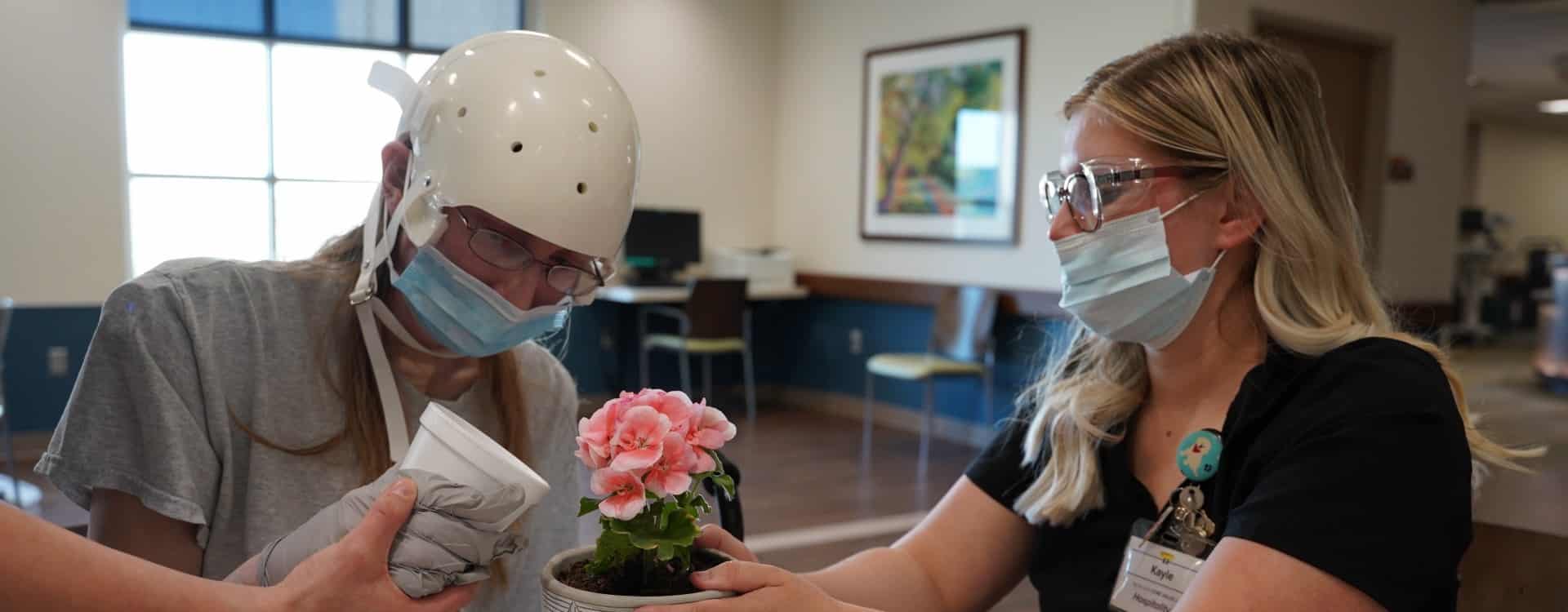Between her three kids, a full-time job at an orthopedic hospital, and the occasional sand volleyball game, Andrea Kuester is a busy woman. A stroke in February temporarily sidelined the 39-year-old former college athlete, but her can-do attitude is proving key to her successful rehabilitation journey.
“Andrea and I are not programmed to ‘settle’, and don’t plan to start now,” said her husband, Ryan Kuester. “She is pushing herself every day, showing no signs of letting up. In fact, I see the opposite. I see her pushing on the gas.”
Ryan said the journey has not been easy. The biggest obstacle on Andrea’s road to recovery has been communication, but time and time again he’s witnessed the sheer determination he’s come to know and expect from his wife.
Andrea has aphasia and apraxia as a result of her stroke.
“Aphasia is a language disorder that not only impacts the way you are expressing things, but the way you comprehend,” said Cait Scott, a speech-language pathologist at Madonna. “Apraxia is a motor speech disorder. That is the difficulty planning the motor movements for speech.”
Andrea’s care team at Madonna Rehabilitation Hospitals Omaha Campus tapped into all the different ways people communicate to supplement her verbal communication. Therapists used a communication book with pictures and short sentences she could point to, and had Andrea write words to express what she was feeling.
With the help of her husband, the care team quickly identified some motivating factors to incorporate into Andrea’s therapy sessions, like her loves of gardening and volleyball. While teaching her new ways to resume her favorite activities, these sessions allowed Andrea to improve her balance and strengthen the muscles in her left arm and leg. Playing to her competitive spirit proved successful in therapy, but the largest source of inspiration came from Andrea’s three children. They also sparked a major breakthrough.
“We’re practicing saying their names,” Scott said. “One of her first words was one of her children’s names. We’re also including their favorite nursery rhymes into our sessions for her to sing. We are doing everything we can so when she goes home she can interact with them.”
While aphasia can greatly impact a person’s ability to speak, it doesn’t affect the ability to sing in the same way.
“It’s not necessarily the singing that’s getting her to say the words, it’s the rhythm and the intonation,” Scott said. “Rhythm and intonation hit a different part of our brain. The left side of our brain controls that language and speech, the right side of our brain controls music and motor movement.”
After more than a month at Madonna, Andrea was able to show off her hard work and impressive progress to those who matter most. On her birthday, Andrea’s family surprised her with a drive-by parade. She surprised them by walking, waving, and joining in as they sang “Happy Birthday.” It’s a celebration her husband says he won’t soon forget.
“I’ve told her a lot since she’s been here that maybe she didn’t realize until she saw all the support and everything, she’s an easy person to like and love,” Kuester said.
After six weeks in intense inpatient therapy at Madonna, Andrea soon starts outpatient therapy with the Rehabilitation Day Program.
“The thing about Andrea is that the sky is the limit,” Scott said. “Because of her age, because of the progress that she’s already made, and because of her motivation and her perseverance, she could make progress for years to come.”





